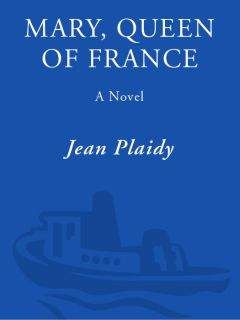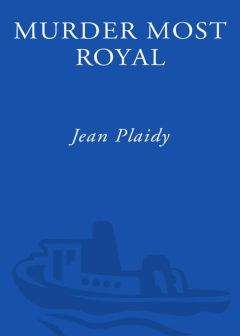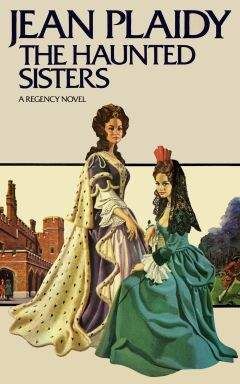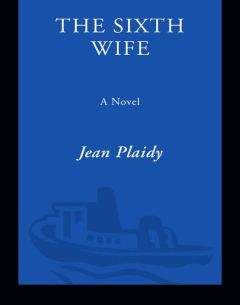Jean Plaidy - Mary, Queen of France: The Story of the Youngest Sister of Henry VIII
На сайте mybooks.club вы можете бесплатно читать книги онлайн без регистрации, включая Jean Plaidy - Mary, Queen of France: The Story of the Youngest Sister of Henry VIII. Жанр: Прочее издательство неизвестно,. Доступна полная версия книги с кратким содержанием для предварительного ознакомления, аннотацией (предисловием), рецензиями от других читателей и их экспертным мнением.
Кроме того, на сайте mybooks.club вы найдете множество новинок, которые стоит прочитать.

Jean Plaidy - Mary, Queen of France: The Story of the Youngest Sister of Henry VIII краткое содержание
Mary, Queen of France: The Story of the Youngest Sister of Henry VIII читать онлайн бесплатно
It was not, of course, a brilliant match, for Anne’s father, Sir Anthony Browne, was merely Lieutenant of Calais; but the Brandons had not known at that time how Charles’s friendship with the heir to the throne would advance his fortunes.
Back at Court he continued to be that friend whom the Prince of Wales kept most often at his side. Sometimes when he and Henry rode out hunting together they would break away from the main party, tether their horses and stretch themselves out on the grass, talking of the future.
Henry said: “When I am King, my first task shall be to conquer France.”
“I shall be beside you,” Charles told him.
“We will go together. None shall stand in our way. You’ll be a good soldier, Charles.”
“At Your Grace’s right hand.”
“Yes,” Henry agreed, “you shall be at my right hand.”
“Your standard-bearer … as my father was to your father.”
Henry liked that; he was inclined to sentimentality.
Then they would talk of the balls they would give when they returned to England as conquerors.
“Fair women to wait on us,” murmured Henry, his little eyes shining.
“The fairest in all England to serve Your Grace, and the next fairest for me.”
Henry liked Charles to forecast the masques and entertainments and this Charles did, for his imagination was a trifle more vivid than his master’s, although not much more so. That was why they were in such accord. Charles only had to remember to be one step behind his master, and all was well.
When he told of his betrothal to Anne Browne, Henry was a trifle envious because he was longing to be married.
“But when I marry it will be to a princess, an heiress to great dominions.”
That was true, and in comparison little Anne Browne, for all her delicacy, for all her charm, seemed unworthy of the greatest friend of the Prince of Wales.
He began to picture Anne at the balls and tourneys. It was difficult to imagine her in cloth of gold and scarlet velvet. He could see her clearly in a quiet country mansion, at his table, in his bed. But at Court? Scarcely.
It then occurred to him that the delectable Anne Browne, disturber of his dreams, was no worthy wife for Charles Brandon.
It was in his grandfather’s house that he first met Margaret Mortymer. Margaret was a widow, ripe and luscious, resentful of her state. Her dark, smoldering eyes were ready to rest on any young and personable man, and when they discovered Charles Brandon her desire for him was immediate.
His grandfather lived quietly in the country not far from London, where Margaret had her home; the two young people were much together while they stayed under the roof of Sir William Brandon.
Margaret’s late husband, Charles discovered, was his grandfather’s brother, so there was a connection, while Margaret herself was distantly related to Anne Browne.
Margaret was well connected, being the daughter of Neville, Marquis of Montacute, and widow of Sir John Mortymer, but in the first weeks of their friendship Charles was more aware of her physical charms than of her family background.
She was older than he was, an experienced widow; and although he was no virgin he learned that he was as yet a novice in the art of lovemaking.
Afterward, those hot summer days lived on in his memory like a dream that would have been best forgotten, but from which he believed he would never quite escape.
His erotic nature was titillated to such a pitch that he was ready to attempt any act which might satisfy it.
“Soon,” she told him, “you will return to Court; and how shall I see you then?”
He did not know, but he assured her that he would find some means of reaching her bed.
“But what of my reputation?” she demanded. “Here it is easy. We are both guests of your grandfather. How can you, a young man, come frequently to my house. How can you stay the night? Only if you were my husband could we be happy.”
He told her of his betrothal to Anne Browne, adding: “If I were free, I would not hesitate to marry you. Why did we not meet years ago?”
Margaret knew the solution, which was that he must obtain a dispensation, which need not be difficult because she had friends in the right quarter who would arrange that it should be procured with speed.
Margaret was a forceful woman. She was not going to let him escape. He thought now and then of Anne with the gazelle eyes and the adoring smile; he knew that she would be bitterly hurt, and he did not want to hurt Anne. He began to suspect that in his way he was in love with Anne, the virgin, more than he could ever be with the flamboyant widow, although his physical need of the latter was greater.
He knew Margaret was a match for him; he knew that she would never allow him to evade her; so he consoled himself that the daughter of the Marquis of Montacute was a better match than that of the Lieutenant of Calais.
Anne’s gentle eyes continued to haunt him until he and Margaret were married, but for the first months he found his life with her all that he could wish, so that he rarely gave a thought to the girl whom he had jilted.
He could not, however, stay away from Court indefinitely and the Prince was commanding his friend to return. It had been amusing to go back, the married man, to confide in the Prince, to bask in the royal and avid curiosity concerning his life with a woman.
But when he returned to her, some of the magic had gone for it was inconceivable that one so lusty could remain a faithful husband and he had discovered that there were girls at Court who could give all that Margaret gave and not demand marriage in exchange. He began to wonder whether he had been a little impulsive, particularly when he saw Anne again, grown taller and no less fragile, reminding him of a pale daffodil. Poor Anne! Her eyes were tragic when they met his, though not reproachful.
His conscience worried him a little, for he feared she might die of a broken heart.
Once more he confided in his Prince. Henry’s response was vehement for the sentimentality of his nature was touched by the thought of little Anne Browne.
“You should have the marriage pronounced invalid and marry Anne,” he told his friend.
“But how so?”
“How so? Marriages are pronounced invalid. Why not yours? If Anne dies of a broken heart you will be her murderer.”
The more Charles thought of Anne the more he desired to marry her and rid himself of Margaret. He was weary of erotic and passionate women for a while; he wanted a pure virgin. He no longer wanted to be instructed, being ready now to act as instructor.
“Anne, Anne, how could I have done this?” he asked himself. “I was led astray. I was young and foolish …”
“There must be means of ending that marriage,” Henry told him. “There are always means of ending marriages which have become distasteful.”
Charles, gratified by the royal interest and setting himself to work on his problem, discovered that the Prince was right. There were always ways. Margaret’s first husband was the brother of Charles’s grandfather. Surely that placed them in the second or third degree of affinity? Then Charles had been betrothed to Anne Browne who was related to Margaret. He was certain that with a little help he could arrange that his marriage should be pronounced invalid on the grounds of consanguinity.
At this time he had another of those brilliant strokes of good fortune which were a feature of his life; Margaret discovered that she was as weary of the union as he was. She wanted a husband who was with her all the time and Charles’s place at Court made this impossible. She therefore would put nothing in the way of having the marriage dissolved.
When he was free, Charles at once sought out his first love and without hesitation married her.
Here was a different kind of wife! Here he had nothing to regret! Anne was meek and loving; she made no demands; she was thankful for any scrap of affection he gave her; and almost immediately she became pregnant.
Like his royal master Charles loved children and the thought of having a child of his own made him very happy. Moreover, Henry was interested in the coming child, and growing more and more impatient to marry and have children. Sometimes Charles feared that his master’s envy might in some way turn him against him; but it did not, and when Charles’s daughter—whom he called Anne after her mother—was born, Henry sent as rich a present as he could afford. Not that it was a handsome gift, as his father kept him very short, but it gave Charles and Anne great pleasure to bask thus in the favor of the man who would one day be King.
For a while Charles was content; he lived his life between the Court and his home where Anne and her little namesake were always waiting for him. There were several light love affairs at Court which was quite natural, he consoled himself, since he must in the course of his duty spend so much time away from the marital bed; and he placated his conscience with the thought that even had Anne known of these she would have understood.
In the course of time she again became pregnant, and little Mary was born.
Henry followed his friend’s married adventures with the utmost interest and chafed more and more at his own bonds which would not allow him to act as freely as Brandon did.
Anne died soon after Mary was born; Charles mourned, but not deeply; he had already begun to wish that he had married a more spirited wife, for life with Anne had been becoming rather dull. Charles began to think then that the humdrum life was not for him; he wanted adventure all the time. Here again he asked himself whether he was Fortune’s favorite, for Anne’s early death had saved him from the discomfort of discovering he had made a second mistake.
He was now free—a widower. It was true he had two little daughters, but he was fond of them and they presented no difficulty. They were well looked after and he visited them from time to time; his visits were the highlights in their lives and they adored him.
Life had taken a very pleasant turn. The old King had died and his friend was now in the supreme position; Henry had a wife of his own and was no longer envious of Charles’s married state. The friendship had not slackened in any way; in fact it grew stronger. At all the coronation jousts and tourneys it was Charles Brandon who was closest to the King. He had a rival in Sir William Compton, but there was nothing new in this because Compton had been a page of Henry’s when he was Duke of York, for the boy had been a ward of Henry VII. Compton was a kindred spirit and Henry was drawn to him, but he was no Brandon; he was neither as tall, handsome, nor as skilled in the joust. Compton had been a butt for them both. “Come on, Compton, you try now,” Henry would say; and he and Charles would look on, mildly contemptuous of the other boy. But Henry had a great affection for him all the same, and Charles had at times wondered whether the Prince might not feel more tender toward one who was far behind him than another who was his equal.
Henry did not forget his friends, and those who had been close to the Prince of Wales were now as close to the King. He at once appointed Compton Groom of the Bedchamber, and shortly afterward he was Chief Gentleman of the Bedchamber, then Groom of the Stole and Constable of Sudeley and Gloucester Castles. But there were equal honors for Charles. Immediately on his accession Henry made his friend Squire of the Royal Body and Chamberlain of the Principality of North Wales; later he became Marshal of the King’s Bench and the office of Marshal of the Royal Household was promised him.
It became clear that King Henry VIII was not going to keep those solemn old men, appointed by his father, in office; he was going to surround himself with the young and the merry. So Charles could look forward to great honors and a successful life at Court.
It was at this stage that Charles became aware that he had attracted the attention of the King’s young sister.
Charles knew that he must act with the utmost care. To be the chosen companion of the Prince of Wales was pleasant and diverting; to be King’s favorite could be dangerous. In those early days of kingship, Henry was a careless giant scattering handfuls of gifts on those he favored, but there were many ambitious men ready to scramble for the treasures he threw so lightheartedly, ready to kick aside those for whom they were intended. And for all his ready bonhomie, temper could spring up suddenly behind those merry blue eyes, turning a smile to a scowl in a matter of seconds.
And at every ball and banquet Charles was thrown into the company of the Princess Mary. She herself arranged this.
There was little of the Tudor caution in Mary; she belonged completely to the Plantagenet House of York. Thus recklessly must her maternal grandfather have conducted himself when he defied his counselors and married the beautiful Elizabeth Woodville, scorning political advantage for the sake of love.
She fired his imagination and his senses; he was certain that if he did not take care she would lead him to such great disaster against which he would be powerless to defend himself. He realized that in all his affairs with women he had never been so close to danger as he was at this time. He knew he should avoid her company. But how could the King’s favorite courtier and the King’s favorite sister, both of whom he loved to have beside him, keep apart?
Whenever Henry wanted to plan some entertainment—and in these early years of his reign he was continually planning them—he would cry: “Brandon! Mary! Come here. Now I would plan a masque.”
And the three of them would sit together whispering in a window seat, Mary between them, slipping her arms through theirs with a childlike gesture which completely deceived her brother.
Charles understood how very near he was to danger on an occasion when Henry summoned them both, with Compton, to his bedchamber.
Henry’s eyes were alight with pleasure. “News, my friends,” he said, “and I tell you before it becomes known to any others. My hopes are about to be fulfilled. The Queen is with child.”
Mary impulsively went to her brother and, putting her arms solemnly about his neck, kissed him. Henry held her tightly against him, tears glittering in his eyes.
“Dearest, I am so happy for you,” said Mary.
“God bless you, little sister. I told Kate you should be the first—outside ourselves—to know it.”
Charles took the King’s hand and kissed it. Then he cried: “God bless the Prince of Wales.”
“Your Grace,” murmured Compton, “there is no news I would rather have heard.”
“Yes, yes,” said Henry. “This is a happy day. You know how I long for a son. My heir … the first of them. Kate and I intend to have a quiver-full.”
“It is a good sign,” Mary told him. “So soon after your marriage.”
Henry pinched her cheek. “You talk like an old beldame. What do you know of such matters?”
“What I learn at your Court, brother,” murmured Mary with a curtsy.
Henry burst into loud laughter. “Listen to this sister of mine! She’s a pert wench and not chary of making this known to her King.”
“She is sure of the King’s love,” answered Compton.
Henry’s eyes were very sentimental as he put an arm about Mary. “Aye,” he said, “and she is right to be. Pert she is, and I fancy somewhat wayward, yet she is my sister and I love her dearly.”
Похожие книги на "Mary, Queen of France: The Story of the Youngest Sister of Henry VIII", Jean Plaidy
Jean Plaidy читать все книги автора по порядку
Jean Plaidy - все книги автора в одном месте читать по порядку полные версии на сайте онлайн библиотеки mybooks.club.




